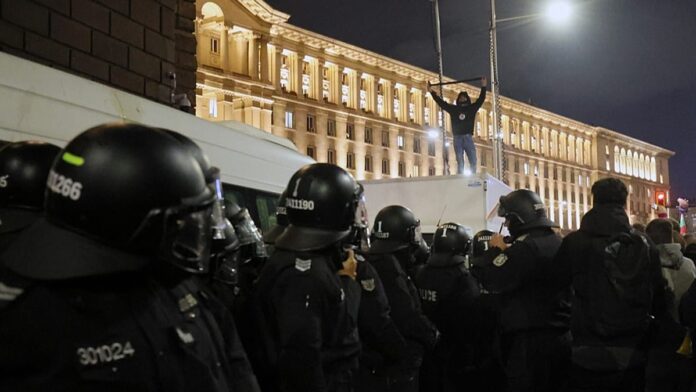Published on
Thousands took to the streets of the Bulgarian capital, Sofia, on Wednesday evening to denounce the steep taxes announced in next year’s budget draft, ahead of a final parliamentary vote on the matter.
The opposition coalition between the “We Continue the Change” and “Democratic Bulgaria” parties organised the rally, drawing an estimated 20,000 protesters. The demonstration comes as the Balkan country prepares to enter the Eurozone at the beginning of next year.
Authorities say three police officers were injured in the line of duty while maintaining public order as protests escalated. Some clashes and skirmishes between riot control units and protesters were also reported.
Some of the protesters attempted to break through the police cordon and threw firecrackers and glass bottles at police forces, during what was declared as a peaceful protest in front of the National Assembly building, according to Sofia Directorate of Interior (SDVR).
Protesters also tried to overturn a police van but were pushed back by the gendarmerie. Authorities say official cars of members of parliament were also pelted and attacked by some protesters.
Protests began at 6 pm local time, where people initially gathered in front of the National Assembly, and shortly afterwards, surrounding it and blocking all exits so MPs inside the building, examining the 2026 budget, to prevent them from leaving.
Some demonstrators say police threw tear gas canisters at crowds of protesters to disperse them.
The protest reflects widespread concern over the budget’s economic impact on individuals and businesses, including the increase in social security contributions and the doubling of the dividend tax.
Despite opposition from various social groups and warnings from economists that the draft carries significant risks, the budget will likely be approved since the incumbent coalition government holds a comfortable majority in parliament.
The budget sets a record for government spending at nearly 46% of Gross Domestic Product (GDP). This increase will be financed primarily through higher taxes on businesses and workers, as well as a sharp rise in public debt.
Additional sources • AP, EBU
